Subtracting decimals is similar to subtracting whole numbers I strongly encourage you to review subtraction of whole numbers before learning this lesson.
Before subtracting, The very first step to take is to line up the decimal points. It is also important to use 0 as a placeholder when a place value is blank.
Look at the following subtractions problems. They are fairly easy to subtract.

In the first problem on the left (0.5 – 0.2), just remove 2 tenths from 5 tenths to get 3 tenths. Then 0 take away 0 is 0. Finally write down your decimal point and the answer is 0.3.
When subtracting 0.2 from 0.5, it is not necessary to say 5 tenths minus 3 tenths. In practice, we do not say all that!
You can just say 5 take away 2 and 0 take away 0. It is the same way you would say it if you were subtracting whole numbers.
By the same token, when doing 4.6 – 2.4, it is as easy as saying 6 take away 4 and 4 take away 2 to get the answer of 2.2.
Subtracting decimals with regrouping and using 0 as a placeholder.
Now look at the following subtraction problem: 0.45 – 0.28

Since you cannot remove 8 hundredths from 5 hundredths, you need to take 1 tenth from 4 tenths and add that to 5 hundredths to get 15 hundredths. Notice that 1 tenth is equal to 10 hundredths. And after you take away 1 tenth from 4 tenths, the tenths place is left with 3 tenths.
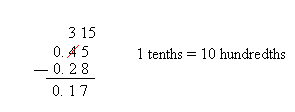
Now, you can just perform the subtraction.
15 hundredths – 8 hundredths = 7 hundredths
3 tenths – 2 tenths = 1 tenth
Finally, 0 – 0 = 0 and put your decimal point.
The following problem shows the importance of using 0 as a placeholder before subtracting:

There is no number in the hundredths place, so using 0 as a placeholder, we get:

Again, we cannot remove 5 hundredths from 0 hundredth, so we will borrow 1 tenth( 1 tenth = 10 hundredths) from 5 tenths and add that to 0 hundredth. Now, the tenths place has the number 4 in it.
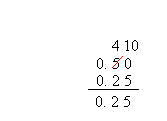
Study too the following example carefully:

Use 0 as placeholders

Then, do the following:
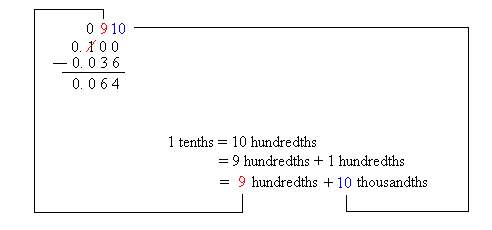
Finally, study this last example too carefully that kind of summarizes everything you learned so far.

Step 1:
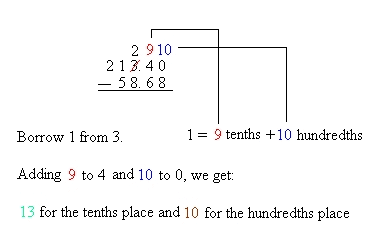
Step 2:

Step 3:
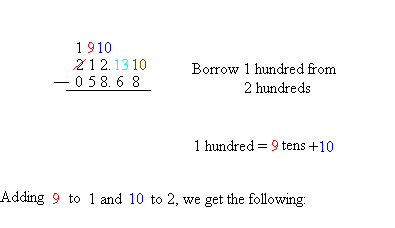

Leave a Reply